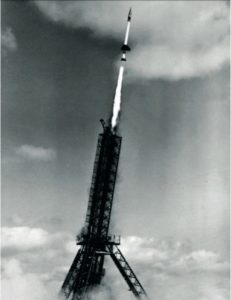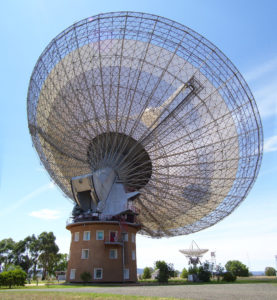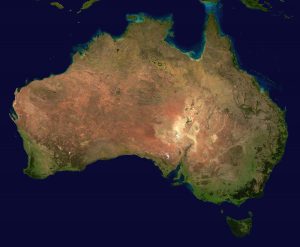Established in 2017, Spacespecialists is a space consultancy/consultants that offers tailored recruitment, training and speaking services to space industry clients across the globe. Based in Cheshire, UK and now also on the Gold Coast of Australia, the team is backed up with many years of experience in the space sector and is now enabling others to benefit from that knowhow and expertise. The Spacespecialists team is headed by Ray Stott, an industry veteran and we took the opportunity to speak to him about the company, the flourishing Australian space sector and the future.
Can you begin by giving us a little background on the company? When and how were you formed and what were the reasons behind its creation?
I felt that after having worked for over 30 years in the space industry that I have enough knowledge experience and a global network to offer something unique in the space sector and decided to form our company, Spacespecialists Ltd to exploit this.
We initially formed the company ‘Spaceraystott’, which started our adventure in 2017, and we thought that opening up a connection between the UK and Australia would be beneficial. Spaceraystott enabled me to attend the International Astronautical congress (IAC ) in Adelaide, Australia and allowed me to introduce myself and the new and exciting format to the space industry.
Since then, we have transformed into a Limited company because after carefully listening to our customers we found there was a lot of interest and that we are offering unique, price competitive services on a worldwide basis in an exciting, vibrant and innovative NewSpace climate. We have grown into a small team and have moved forward with enthusiasm from the response. We are now discussing many opportunities both public and private and have found that our three services are in great demand worldwide, and particularly embraced in Australia.
What has attracted you to Australia? What level of potential do you see in the Australian market?

We are attracted to the Australian market because of the space history between Australia and the UK, including the first rocket launches from Woomera and others. We feel personally involved in collaborating with the Australians even more now due to Brexit and the transformation happening in NewSpace globally.
We feel the ‘mateship’ between us is second to none and with the creation of the Australian Space Agency (ASA) announced at the International Astronautical Congress (IAC) in Adelaide in 2017 and completed in July 2018, provides the opportunity for both our countries to work closely together and forge deep long lasting relationships as we have been doing since 1777!
We believe Australia is our New Frontier not only on Earth but also in space. Australia offers unique business opportunities to exploit from space that have not been fully capitalised on such as mining capability, agritech, the ocean and environmental protection, earth observation, space situational awareness, deep space network, small satellite manufacturing, ground stations, emerging small rocket capabilities for launching LEO satellites, science, navigation, telecommunications, security, robotics, AI and automation, to name a few.
How has your experience been so far as a space start-up company in Australia? How have you been received? Do you feel a part of the space eco-system in Australia?
We are pleased to say the welcome has been second to none and the Australians as a whole have been very welcoming. There are issues, as there are anywhere, where companies do not respond nor communicate but we can definitely say the Australian space industry as a whole is responding in a very positive nature. We do now feel part of the space eco-system and we are building partnerships to showcase this as well as being available as a valuable resource as Australia re-enters the space sector, offering unique products and services competitively on the global stage.
Tell us about some of the work Spacespecialists is involved with in the country at present. Is recruitment forming a key part of the work you do as the amount of space companies increases who are looking for talent?
We have been approached by one of the leading space companies in Australia for both technical and recruitment support. We have been in communication with the head of the Australian Space Agency and been very well received.
We were recently welcomed to present and talk on ‘Recruitment Challenges for the Australian Space Industry’ at the 18th Australian Space Research Conference in September 2018 held on the Gold Coast, Queensland, Australia.
As it is still early days, we cannot answer this question in full yet but by being here in our second office that we have established here on the Gold Coast in January 2018, we can say it has been a pleasurable and memorable experience so far and we are growing our business accordingly.
Yes, recruitment is a vital part of all of the companies and organisations we are working with. This often underestimated, including staff retention. Training is also required, to not only bring in Spacespecialists to kick start key areas of missing talent but also to provide the knowledge and experience to train the NewSpace workforce.
What impact is the growth of the space sector having in Australia? Has the establishment of the Space Agency had a very positive effect?

Parkes radio telescope viewed from the visitor’s area. Credits: Wikipedia
The Australian space sector has always been here from the 1960s to present day with Woomera and the Parkes Radio Telescope that supported the Apollo Moon missions as prime examples. The industry as a whole is still here but was fragmented and without government support. We understand now that the Government has decided to reinvigorate the sector by not only forming the Australian Space Agency but by providing key funds and support at the same time for the specific space initiatives including Precision Navigation and Timing (PNT, GPS etc), robotics, automation, R&D, remote sensing and earth observation, for example.
The Australian space industry will become a key player on the world stage and can provide unique capabilities not only due to its favourable space-related geographical position on Earth and history in space but also due to the careful efforts that were analysed and studied to make the Australian space sector compete internationally
The ASA has identified 7 key areas for the space sector;
- Communications technologies, services and ground stations
- Space Situational Awareness (SSA) and debris monitoring
- Positioning, Navigation and Timing (PNT) infrastructure
- Earth Observation from Space (EOS) data and services
- Robotics and Automation for remote asset management
- Research and Development (R&D)
- “Leapfrog” opportunities
There is a heavy focus on NewSpace within the space sector at present. Why is Australia so ripe for this kind of technological development?
Australia can capitalise on the NewSpace opportunities due to the highly trained and available workforce with amazing capabilities developed at the universities and the industry for CubeSats and new technology. Australia has an interesting, uniquely developed capability in Space Law. The costs and risk for the investment in NewSpace is ideal for Australia to capitalise on this new wave.
What challenges does the country face as it builds its space industry?

The country must be competitive and innovative to compete on the world stage and a key challenge is to leverage the ‘lessons learned’ from other new Space Agency experiences around the world and identify what can Australia offer at a good price to compete internationally in the very fast changing market. Being able to attract the right talent is part of this challenge but also practical solutions for work/visitor/temporary visas that enable Australia to attract and retain talent.
A lot of the Australian diaspora is spread around the world and attractive opportunities ‘back home’ with a good salary and work/life balance can be made to attract this important talent back into the country at this critical growth time for the space sector. A liberalisation on investment and the approach to risk will need to be cultivated in order to compete with Silicon Valley in the USA and other emerging space nations such as China and India.
Cultivating and maintaining good communication with the public for the practical space project investments and industry sponsored investments is critical to ensure future long-term growth, sustainability in the sector and public support. There has already been fantastic feedback on the formation of the ASA and the opportunities for STEM (Science Technology Engineering and Mathematics) and public outreach.
What’s next for Spacespecialists? It’s a very exciting time to be in space in Australia!
Yes, we have recently signed some important MOUs (Memorandum of Understanding) which we will announce soon on exciting space projects and initiatives. We are focused on building the capability of our three key services of Consulting/Consultants, Permanent and Contract Recruitment and Training (customised for Clients and also online) and Talks from our base in the UK covering Europe and EMEA regions, from our Australian office for the Asia Pacific Region and we have plans in a couple of years to open an office in the US to cover the Americas.
Another exciting development is our ability to offer bespoke consulting services e.g. in FPGA electronics design for satellites, launcher and ground segments through our partnership with Adam Taylor and his company Adiuvo Engineering & Training Ltd. We are also expanding with strategic partnerships covering system engineering, space optics, mechanical design and electronic manufacturing for space projects.
We are continuing to build a global capability to supply our clients with space specialists in both permanent and contract jobs. We offer this for administrative, technical, commercial and managerial positions in both the Upstream (satellite/equipment manufacturers, launchers and ground segment) as well as being particularly focussed in the Downstream (companies that use space/satellite data e.g. earth observation, towns/city planning departments, weather forecasting, telecommunications, IOT, M2M and other NewSpace initiatives).
We are pleased to be able to increasingly offer space related training courses – for example we can now offer our one-week ‘Space Project Management Course’ with experts from the Space Industry talking about real industry case studies to enable scientists and engineers to manage the increasingly complex, multi-million dollar projects that space agencies around the world are awarding to companies and industry.

About Ray Stott: Ray is an International Space Consultant with over 30 years’ experience in the manned & unmanned Space Industry. Starting his professional career at BAe Space Systems (Airbus Defence & Space) in Stevenage, UK as a sponsored student apprentice, he has since travelled the world working in diverse locations including Kourou in French Guiana , South America, Italy, Canada, The Netherlands, Germany, Cyprus, Belgium, UK, Australia and has recently opened a 2nd office with his company ‘Spacespecialists Ltd’ on the Gold Coast, Queensland in Australia complementing the Head Office in Cheshire, UK.
SpaceWatch.Global thanks Ray Stott of Spacespecialists for the interview.






